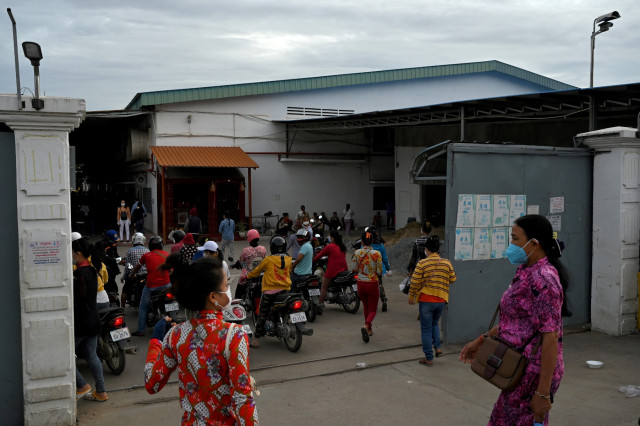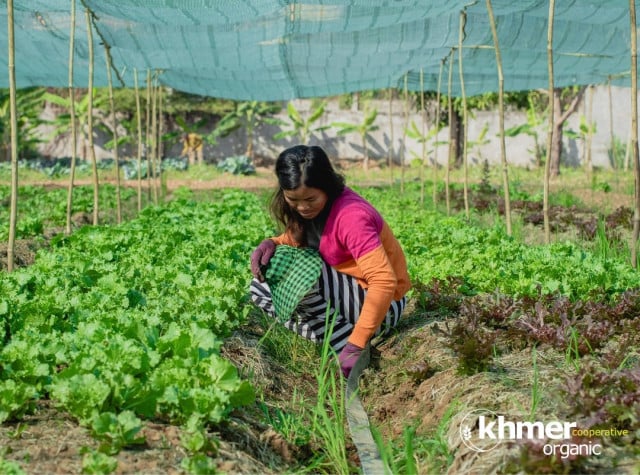No New Order Affects Workers as Factories’ Closures and Suspension Increase

- By Meng Seavmey
- January 30, 2023 10:40 AM
PHNOM PENH — The loss of duty-free exports, the lack of new orders, economic pressures and inflation have led to factories’ closures and workers’ layoffs. Still, the number of factories opening increased in 2022 compared to the previous years.
However, the situation is raising serious concerns among workers as some factories have announced they were suspending operations while one declared bankruptcy, leaving thousands of workers unemployed in the first month of 2023.
Say Sokny, vice president of the Free Trade Union of Workers of the Kingdom of Cambodia (FTUWKC), said the organization has received many complaints and heard many concerns from workers and company representatives over the permanent or temporary closure of factories since the start of the COVID-19 outbreak in early 2020 due to getting too few orders compared to production.
The number of factories suspending operations is higher than the number of those closing, Sokny said in interview on Jan. 26. However, one factory permanently shut down, laying off 885 workers, she added.
Production lines usually get suspended every two months, Sokny said. Based on the information received so far, five factories employing 10,789 workers have suspended operations, although two are reopening following new orders, she said.
Based on the information received since the start of 2023, Sokny said, “[t]he large number of the unemployed workers who got laid off since the fourth quarter of 2022 until now [and who informed the union of this] was 15-to-20 percent of the total number of factories across the country that have been facing the problem of no orders.”
Still, according to Heng Sour, secretary of state of the Ministry of Labour and Vocational Training, the situation regarding factories’ closure and work suspension has improved and was good in 2022 compared to 2021, with more factories opening and job opportunities.
According to the data he provided, there were 234 garment, textile and footwear factories open in 2022, employing more than 72,000 workers, which was better than 2021 during which only 191 factories were operating, employing 71,000 workers.
Also in 2022, a total of 132 factories closed, leaving 52,000 workers unemployed while in 2021, 164 factories had shut down, laying off 73,000 workers, Sour said. Therefore, the situation of factories opening or closing was better in 2022.
However, from the third quarter and in the early fourth quarter of 2022, there were 146 garment, footwear, and travel-product factories employing nearly 90,000 workers that suspended operations, which was a lot more than in 2021 when only 111 factories employing nearly 60,000 workers stopped operations.
The increasing suspension of operations has become a trend caused by inflation and by the decline in orders coming from the export markets in the United States and Europe.
Still, the job market is doing better as the sector has created jobs for more than 30,000 people in 2022, which is much more than in 2021.
Factors challenging factories’ survival
According to Say Sokny of the Free Trade Union of Workers of the Kingdom of Cambodia, several factors have affected those factories’ survival and workers’ employment, starting with economic pressure and inflation.
Since September 2022, factories’ representatives have complained about receiving less and less new orders, if any, leaving factories with only their remaining old orders, because the factories’ international markets in Europe, the United States, Canada, Australia, New Zealand, and Japan have been closed.
Moreover, Sokny said, the increasing inflation and the rise of prices of oil, gas and fuels due to the war between Russia and Ukraine have affected the livelihoods of a large number of people with average lifestyles.
Speaking of politics, the trade union vice president said that factory representatives have raised concerns regarding the national election of July 2023, fearing riots as in 2014 and workers asking the government for a wage-increase policy during the campaign. “They are afraid of a conflict happening again before the election,” Sokny said.
“They still have trust issues about the possibility of riots. The factories were worried about the progress of their production lines such as duration and the amount of the work, and some of them even moved the orders to other countries,” Sokny explained, citing companies’ statements.
Another factor still worrying factory owners and managers is the COVID-19 epidemic, she said. A universal issue, developed countries seem to have been recovering faster than developing countries such as Cambodia. Plus, the context of the number of factories increasing is also one reason.
“Based on assumptions, observations, and studies,” Sokny said, “some factories—not only [in] garment but also others, travel goods production, [etc.]—are under the same owners’ names.” Sokny said. So new factories are open for different products while the old ones close due to zero new orders, she said.
Agreeing with Sokny, Ath Thon, president of the Coalition of Cambodian Apparel Workers' Democratic Union (C.CAWDU), added that seasonal demand is also a factor. “If the products are not in demand due to the different seasons, then there are no new orders for the products from the markets.
“Unionists have noticed that many factories did not have much work for the workers either—they leave work at 4 p.m. at the latest because there has not been any overtime work—in around 30-to-40 percent of the total number of factories while the rest are doing well as usual,” Thon said.
Say Sokny added that the owners only thought of profits: They do not think about anything but the competition of high-production lines or markets, income, and facilitation of the investment law. They focus on the 3 Ps, she said: no permanent friend, no permanent enemy, but permanent profit.
The 20 percent loss of exports due to the withdrawal of the “Everything But Arms” (EBA) duty-free and quota-free benefits from the European Union decreased the number of orders. In the meantime, the United States’ Generalized System of Preferences (GSP) trade program, which expired in 2021 for Cambodia, has yet to be reinstated.
If factories have to pay more to export, then they will face challenges and competitiveness from other countries’ factories, Sokny continued. In addition, the replacement of workers with technology in a low-cost labor country such as Cambodia is another concerning factor because manpower is low-skilled workers. It has been contextualized that the owners care more about their profits.
Seeking new jobs although with little likelihood of getting one
Several concerns were raised by the unionists regarding the matter of the layoff and suspension of this big number of workers. Their unemployment in the meantime—long term or short term—affects their ability to feed their families, pay rent, buy food, repaying debts or loans, and supporting themselves.
Which leads to increasing their loans, the unionists say.
Adding to Ath Thon’s statement, Sokny said there are two options that workers have chosen over the last 15 years: working in informal service sectors, or going abroad to work either legally or illegally through systems, brokers, companies, or on their own.
Ath Thon said the problem is that, with a lot of supplies, demand decreases. In this sense, when there are many workers seeking positions, the employee selection will be strict and picky: They only choose those with higher skills, he said.
“It is very concerning when the workers who have lost their jobs cannot find another job to get an income in the meantime,” he said.
Yang Sophorn, president of Cambodian Alliance of Trade Union (CATU), said that unionists cannot really help workers find new jobs, which is a concern.
“Our help is telling them about recruitment or hiring posts…and the help from the Ministry of Labour and Vocational Training as well as other relevant ministries,” Sophorn said.
There is the Nation Employment Agency (NEA) of the Ministry of Labour for job seeking. However, Sophorn said she is not sure whether it is because the agency is inactive or the workers do not have enough skills, or is it because it takes so long, that the workers have to find jobs by themselves.
“It is an obligation for the government to study inflation, markets, and other things to guarantee the sustainability of the workers’ jobs, because if the workers do not have jobs, then the national income also decreases, which puts the burden not only on the workers’ families but also on the government,” Sophorn explained.
Regarding this, FTUWKC Vice President Say Sokny said that broadening the democratic space and ending internal conflicts while making national interest the priority is what can help solve the problem.
While support may come from the developed countries—they may help provide knowledge to support livelihoods, give job opportunities, help healthcare services, insurance and pensions, renew GSP and EBA if possible, facilitate the situation regarding democracy, and help with natural disasters—it is important for Cambodia to help itself even though there are many wealthy countries helping.
The loss of EBA and GSP has greatly affected the garment industry. Renewal remains pending as some requests such as those of the European Union regarding further expanding the democratic space were not taken into consideration, the Cambodian authorities saying that the democratic space was already good and free.
“The increasing number of trade unionists and civil society organizations, compared to before, has only helped a little in the process because not every organization is brave enough to express themselves on the matter,” Say Sokny said.
Ending internal political conflicts is what is needed to help improve the current labor situation, she said. “That will be the true peace: peace for our minds and peace for poor people,” Sokny said. “I think that improving the democratic space will help ease the situation.”















